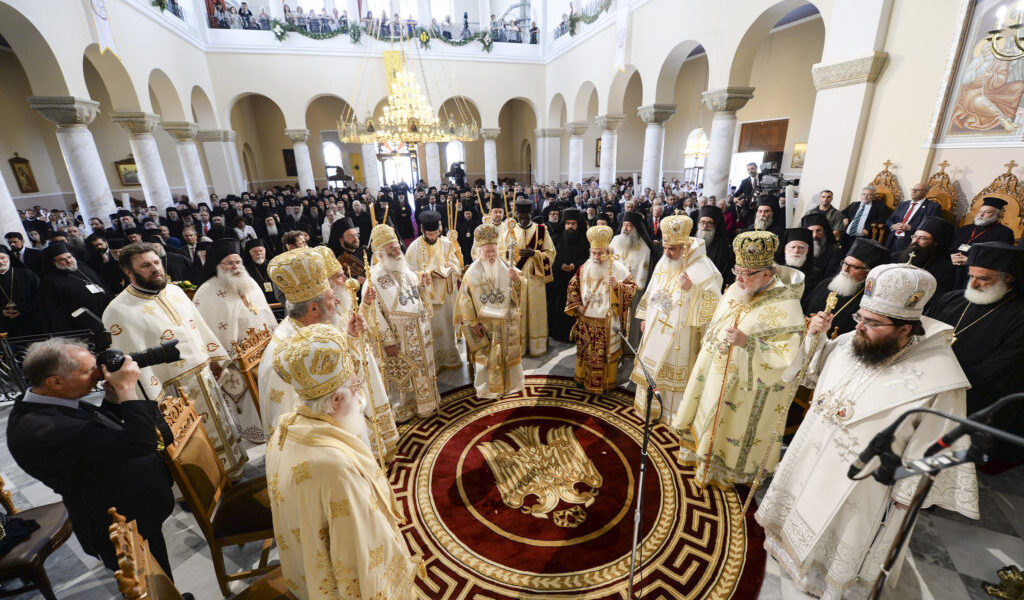
It would sound like a truism to say that in the Orthodox Church the ultimate source regarding the truth of faith and the ethos of Christian living comes from what theology calls an ecumenical council. Of course, which council is considered ecumenical is another issue altogether, since many a time in Church history there have been councils designated as ecumenical without really being so.
This implies at least two things. Firstly, that the Orthodox Church is an intrinsically synodal version of Christianity and, secondly, that the Orthodox Church represents a profound version of Christian ecumenicity. In other words, there might be excessive talk about synods in this or that Christian group and community, but Orthodox synodality is something quite different; and we might also be familiar with the assumption that Christianity is an ecumenical religion, but the ecumenicity of Orthodoxy points to something more than that.
Synodality is what makes synods possible in the Church in the first place, while ecumenicity is what makes the Church really open to all and everything. To be sure, it seems that synodality and ecumenicity are embedded within the Orthodox Church as an integral pair: they go together, and they feed upon one another. More to the point, though, it seems that synodality comes before and at the same time goes beyond synods, whereas ecumenicity cannot just fit into the confines of the ecumenical – even if the latter are the greatest that can be …
The Synodality of the Church
In the historical life of the Church there are local, regional, great and ecumenical synods – as well as many other synodal designations – but the real question in this connection is why a synod is a constant in Church life and, by extension why it is so important. There must be something in the Church, something that has to do with the phenomenology of the Church (that is, its gist and the way this gist manifests itself), which renders necessary the existence of synods as an institution.
On the one hand, synods became gradually a kind of exclusivist institutionality in the life of the Church, insofar as they were restricted to bishops and functioned as a top-down channel of Church administration. In a way, we could say that the Church became – especially in modernity – the Church of synods, whereas the reverse, that is, the synods as synods of the Church, should have been the natural and expected understanding of this relationship. Nowadays there are synods in place everywhere and working virtually on everything …
Unfortunately, the synod as an institution stopped being the synod-exceptional-event, that is, the significant gathering that due to dire and crucial problems – problems of salvation in the context of specific socio-historical challenges – was called upon in order to pinpoint afresh the path and direction that the faithful should pursue in their journey towards the Kingdom of God. It might sound like an exaggeration, but this shift from the synod-exceptional-event to the synod-everyday-procedure came along with an understanding of the Holy Spirit as an accessory of Church bureaucracy …
On the other hand, nevertheless, the Church never lost its intrinsic synodality – for it is the latter that constitutes the condition of possibility for any type of synod in the Church. This synodality, as the fundamental and comprehensive and ultimate frame of reference of Being-together in the Church, lies in the mystery of the Church as the body of Christ – not just the ontological (which can be taken as rather abstract), but even more so the historical body of Christ. As long as the Church happens, time and again, through and thanks to the Eucharist, this synodality of the faithful will always manifest itself as their preeminent accord and unity and not some kind of consultation agreement …

The Ecumenicity of the Church
The 20th century has undoubtedly been the century of ecumenical awareness; so much so, that now we even refer to a distinctive phenomenon when we use the term ‘ecumenism’. However, from the very beginning of its historical life the Church confronted the problem of whether or not it stood for the ecumenical: Was the calling of the Church for some or for all? If it had an ethnic grounding, how could it be for all peoples? What was the real basis of the ecumenical openness of the Church and how was it expressed and realised?
The answers to these questions are well-known: Christ has called His Church to embrace all, to create a new type of Israelite, for in His person He took on – fully and perfectly – the entire human nature; and if there was a mentality that lent itself to this comprehensive embracement of humanity in the best possible way, then this was non else than the self-transcending and self-shattering disposition of the Hellenic spirit. Simply put, the synodality implicit in the Hebrew qahal (congregation, assembly) fused with the ecumenicity implicit in Hellenic universalism giving thus birth to the Christian Ecclesia.
In this respect, one could say that if the synodality of the Church is related to the Hebrew emphasis on continuous, cohesive and collective historicity, the ecumenicity of the Church is associated with the Hellenic focus on the transcending and comprehensive fullness of humanity. We do not call the Church ecumenical simply because it is inclusive of all nations; this is actually the end-result of its ecumenical thrust, which has been superbly embodied within the spiritual yearning that the Hellenic spirit – not the Hellenic nation, culture or language – bestowed on the face of Earth.
Thus, I would say that synodality is the horizontal axis of the life of the Church, whereas ecumenicity is its vertical axis; or, to phrase it differently, the former is its breadth, while the latter is its depth. And you need both in order to have the catholicity of the Church. It is crucial that we keep in mind that catholicity requires depth as well as breadth, otherwise we are going to misconstrue it as a global corporate organisation. Moreover, no Orthodox should be afraid of celebrating their ecumenicity, for this is one thing and ecumenism is quite another …
The Ecumenical Synodality of Eschatology
History and universality, the Hebrew and the Hellenic, the particular and the general, the coming-together and the going-beyond … these are the two aspects of humanity that have been combined and recreated in the Orthodox Church, pointing to the anticipation and at the same time the realisation of divine life. Experiencing this life in the Church is what constitutes the eschatological Being/Becoming of the faithful; not alone but will all true expressions of the faith in the past, present and future, and not once and for all but time and again more and more!
This new condition of life – not alone and not once and for all – is the ecumenical synodality of eschatology. If some believe that they are faithful to the synodality of the Church simply by holding synods, and if some claim to be ecumenical just because they are inclusive, then let them know that they are deluding themselves.
The true and greatest synod of all is the history of the Church as it will be revealed in all its glory in the Kingdom of God, while the most trustworthy expression of ecumenicity is the spirit of the Church that has always emptied itself so that the Other might be given a place to be!
ABOUT | INSIGHTS INTO GLOBAL ORTHODOXY with Dr Vassilis Adrahtas
"Insights into Global Orthodoxy" is a weekly column that features opinion articles that on the one hand capture the pulse of global Orthodoxy from the perspective of local sensitivities, needs and/or limitations, and on the other hand delve into the local pragmatics and significance of Orthodoxy in light of global trends and prerogatives.
Dr Vassilis Adrahtas holds a PhD in Studies in Religion (USyd) and a PhD in the Sociology of Religion (Panteion). He has taught at several universities in Australia and overseas. Since 2015 he has been teaching ancient Greek Religion and Myth at the University of New South Wales and Islamic Studies at Western Sydney University. He has published ten books. He has extensive experience in the print media as editor-in-chief, and columnist, and for a while he worked as a radio producer. He lives in Sydney, Australia, his birthplace.

